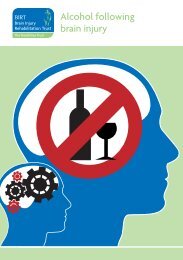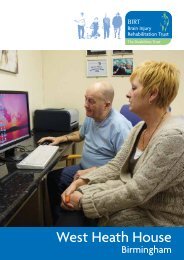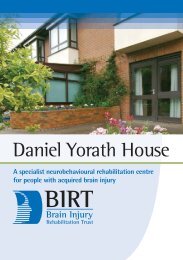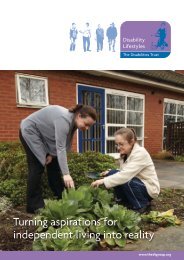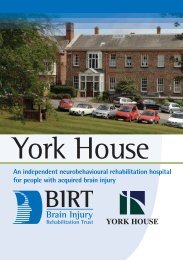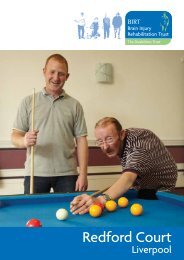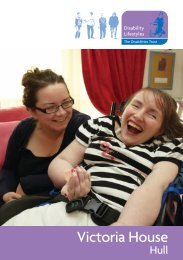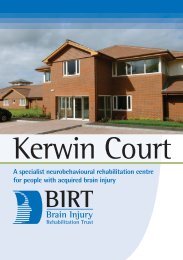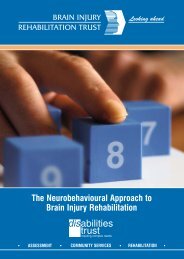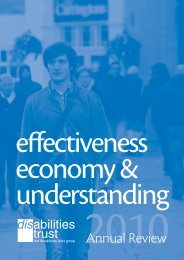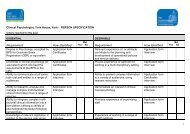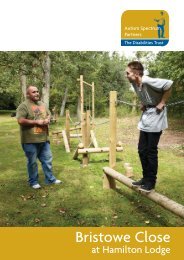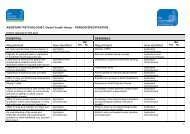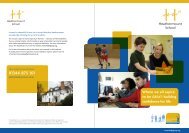Thomas Edward Mitton - The Disabilities Trust
Thomas Edward Mitton - The Disabilities Trust
Thomas Edward Mitton - The Disabilities Trust
Create successful ePaper yourself
Turn your PDF publications into a flip-book with our unique Google optimized e-Paper software.
<strong>Thomas</strong> <strong>Edward</strong> <strong>Mitton</strong><br />
House
“We aim to provide<br />
the best quality<br />
neurobehavioural<br />
rehabilitation<br />
for people with<br />
complex and<br />
challenging needs<br />
after brain injury.<br />
Ultimately, we want<br />
to enable service<br />
users to participate<br />
in life as fully as<br />
possible, needing<br />
the least possible<br />
assistance.”<br />
Professor Michael Oddy,<br />
Director of Clinical<br />
Services, BIRT<br />
2
What is <strong>Thomas</strong> <strong>Edward</strong><br />
<strong>Mitton</strong> House<br />
Located in Milton Keynes, <strong>Thomas</strong> <strong>Edward</strong> <strong>Mitton</strong><br />
House is a specialist rehabilitation centre that provides<br />
residential rehabilitation for people with acquired<br />
brain injury. It forms part of the nationwide network of<br />
rehabilitation support services provided by <strong>The</strong> Brain<br />
Injury Rehabilitation <strong>Trust</strong> (BIRT).<br />
What does it do<br />
<strong>Thomas</strong> <strong>Edward</strong> <strong>Mitton</strong> House works with people<br />
who have to cope with a range of cognitive, physical<br />
and/or emotional symptoms following a brain injury.<br />
Rehabilitation is based on a neurobehavioural approach<br />
and focuses on enabling service users to function more<br />
independently and to participate in as many of their<br />
previous roles and activities as possible, while developing<br />
their lives with privacy, dignity and respect.<br />
3
Facilities<br />
Set in attractive landscaped gardens, <strong>Thomas</strong><br />
<strong>Edward</strong> <strong>Mitton</strong> House offers an outstanding setting<br />
for rehabilitation. All service users have their own<br />
comfortable en suite bedrooms, complemented by<br />
spacious and well-appointed communal areas for dining<br />
and relaxation.<br />
Rehabilitation takes place in a modern, tranquil and<br />
superbly equipped environment, with a special emphasis<br />
on assistive technology. Service users enjoy access to<br />
a wide range of therapeutic and recreational activities<br />
including cooking and computer skills and a dedicated<br />
games room.<br />
In addition to the main 16-bed residential centre there are<br />
two nearby transitional living units where service users can<br />
continue their rehabilitation in a community environment.<br />
We also offer a supported house in the local community,<br />
where residents who have reached their optimum level<br />
of independence are able to live with staff support, and<br />
an assistive technology bungalow for assessment and<br />
rehabilitation.<br />
4
Environment<br />
Access to the wider community forms an important part<br />
of rehabilitation. Its close proximity to shops and leisure<br />
facilities and easy access to the centre of Milton Keynes<br />
makes <strong>Thomas</strong> <strong>Edward</strong> <strong>Mitton</strong> House ideally situated<br />
for social integration and also offers opportunities for<br />
education and work placements.<br />
Family support<br />
<strong>Thomas</strong> <strong>Edward</strong> <strong>Mitton</strong> House operates a family support<br />
group for relatives of service users to provide education<br />
and emotional support, both individually and within a<br />
group setting.<br />
5
Assessment<br />
When a service user is admitted to <strong>Thomas</strong> <strong>Edward</strong><br />
<strong>Mitton</strong> House they undergo a 12 week neurobehavioural<br />
assessment to determine their potential for social<br />
reintegration and increased independence. This includes<br />
assessments of, for example, cognitive skills, the nature<br />
and frequency of any challenging behaviour and the<br />
service user’s ability to engage with the community and<br />
complete functional daily tasks.<br />
At the end of the assessment period, a meeting is held<br />
at which family, funders and other involved parties join<br />
the team to discuss the results. This enables the team<br />
to identify any barriers to recovery and link these with<br />
a course of rehabilitation and support, while also taking<br />
into account the aspirations of the service user and<br />
family members.<br />
6
Rehabilitation<br />
If a formal course of rehabilitation is recommended,<br />
the service user begins an individualised treatment<br />
programme. This includes learning and therapeutic<br />
sessions, personal, social and domestic skills, guided<br />
leisure time, community access, behavioural management<br />
and vocational training and support. Service users are<br />
actively involved in reviewing their progress against<br />
pre-agreed outcomes.<br />
<strong>The</strong> average length of a residential placement varies<br />
depending on an individual’s needs, with many of our<br />
service users moving on to live in a more independent<br />
supported environment in the community. <strong>The</strong>re are<br />
also opportunities for short-term and weekdays-only<br />
rehabilitation .<br />
7
“This service<br />
is very<br />
professional and<br />
well organised.<br />
I would highly<br />
recommend it.”<br />
Referrer<br />
Clinical practice and<br />
clinical team<br />
<strong>The</strong> clinical team at <strong>Thomas</strong> <strong>Edward</strong> <strong>Mitton</strong> House<br />
comprises professionals from a wide range of disciplines,<br />
all of whom are recognised in their field as having special<br />
expertise in the management of brain injury. <strong>The</strong> team is<br />
led by a consultant in neuropsychology and rehabilitation<br />
and includes a clinical psychologist, speech and language<br />
therapist, physiotherapist, occupational therapist and<br />
rehabilitation support teams.<br />
Clinical practice is based on a neurobehavioural approach<br />
and focuses on a combination of social and behavioural<br />
interventions to aid recovery of independence. <strong>The</strong><br />
emphasis of assessment is on a systematic and structured<br />
observation of behaviour and skills in everyday situations<br />
and tasks. Clinical governance is promoted through BIRT’s<br />
Clinical Executive, a national forum comprising consultants<br />
in neuropsychology and rehabilitation from across BIRT’s<br />
services. Led by Professor Michael Oddy, the Clinical<br />
Executive is committed to promoting clinical governance,<br />
training and research, as well as developing and reviewing<br />
clinical policies and procedures.<br />
Accreditation<br />
<strong>Thomas</strong> <strong>Edward</strong> <strong>Mitton</strong> House has been awarded full<br />
accreditation with the Commission on Accreditation of<br />
Rehabilitation Facilities (CARF), and is registered with the<br />
Care Quality Commission (CQC), receiving consistently<br />
excellent reports.<br />
8
Continuum of care<br />
BIRT offers a nationwide continuum of services for people<br />
with acquired brain injury including post-acute hospitalbased<br />
rehabilitation, assessment and rehabilitation,<br />
continuing rehabilitation and community support services.<br />
<strong>The</strong> duration of placements at <strong>Thomas</strong> <strong>Edward</strong> <strong>Mitton</strong><br />
House varies, depending on the service user’s level of need<br />
and their potential for rehabilitation. A service for those<br />
with longer term rehabilitation needs is also available.<br />
9
Meg’s Story<br />
“I am settled into my room and my new lifestyle<br />
and I’m pleased to say that I love it. Moreover, I’m<br />
moving onto my next step of living independently<br />
in my own house.” Meg Elliot<br />
In August 2010, Meg Elliot, 26, was involved in a serious accident while<br />
climbing in Snowdonia. She was a very experienced climber and<br />
worked as an instructor for a local climbing centre. However, due to an<br />
unfortunate sequence of events, she fell from a height of 30 feet off a<br />
vertical rock face, striking her head upon impact and suffering a severe<br />
brain injury. She also received a broken neck, back, ribs<br />
and a punctured lung.<br />
Meg was admitted to Liverpool Hospital Intensive Care<br />
Unit where she remained for four months. <strong>The</strong> first<br />
two months she spent in a coma. When she regained<br />
consciousness, she had no recollection of the accident.<br />
Meg was transferred to <strong>Thomas</strong> <strong>Edward</strong> <strong>Mitton</strong><br />
House (TEM) in December 2010. With the help of the<br />
TEM team, and much self-determination, she made<br />
rapid progress, with a programme that included occupational therapy,<br />
physiotherapy and speech and language therapy.<br />
When she arrived at TEM, Meg found it a challenge to walk, even with<br />
a wheeled walking aid. Not only is she now able to walk with just one<br />
stick, but, with her sister Ruth, she has also come second in a sailing<br />
competition.<br />
Shortly before her accident, Meg had graduated from Bangor<br />
University with a 2:1 in English, and she continues to pursue her<br />
passion for words by creating a newsletter for TEM House, as well as<br />
writing an article, on which this case study is based.<br />
10<br />
Meg has now moved to a community house in Northampton,<br />
run as a part of BIRT’s continuum of care. She is living much more<br />
independently and hopes to find work as a writer.
“I have been very<br />
impressed by the<br />
multi-disciplinary<br />
team; particularly<br />
the goal setting for<br />
each rehabilitation<br />
period and the<br />
accuracy of reports.”<br />
Referrer<br />
Outcomes for service users<br />
BIRT uses a series of standardised rating scales to assess<br />
cognitive, emotional and behavioural changes over time.<br />
Each service user is assessed during their first month of<br />
admission. <strong>The</strong>se results are then compared with the same<br />
measurements sampled during the last month prior to<br />
discharge. This includes monitoring of mood, behaviour<br />
and motivation, together with any demonstration<br />
of verbal or physical aggression. As well as enabling<br />
us to measure service users’ progress, the outcome<br />
measurement system also acts as a valuable tool for<br />
individual goal setting during the rehabilitation programme<br />
and informs the ongoing care pathway.<br />
Of service users admitted to <strong>Thomas</strong> <strong>Edward</strong> <strong>Mitton</strong><br />
House in 2011 over 90% required either direct or<br />
indirect full-time supervision on admission. At the<br />
point of discharge, only 59% of service users had fulltime<br />
supervision needs, with 32% requiring part-time<br />
supervision and 10% independent in their supervision<br />
needs. This represents a considerable reduction in the<br />
level of supervision required on discharge compared with<br />
admission.<br />
86% of service users were admitted from residential care,<br />
yet on discharge only 27% continued to require residential<br />
care, nearly half (46%) were discharged to supported<br />
living, and 27% were able to discharge to independent<br />
accommodation with family. This represents a very<br />
positive result for the majority of service users.<br />
12
People admitted to <strong>Thomas</strong> <strong>Edward</strong> <strong>Mitton</strong> House<br />
generally require very high levels of support as a result<br />
of their brain injury. <strong>The</strong> fact that so many can return<br />
to living at home is a tribute to the success of the<br />
neurobehavioural approach used by BIRT and the skills<br />
and dedication of our staff.<br />
13
Quality and value for money<br />
BIRT’s continuum of care ensures that in most cases a<br />
reduction in costs occurs as a service user moves towards<br />
greater independence. On average, the lifetime cost<br />
savings are between £800,000 and £1 million, if a service<br />
user is admitted within one year of brain injury.*<br />
Reducing costs through the BIRT continuum - a case study:<br />
When Steven came to BIRT, any attempt to engage with<br />
him resulted in outbursts of violence and aggression. After<br />
moving through BIRT’s continuum of services, costs were<br />
reduced as follows:<br />
Challenging Behaviour Assessment & Rehabilitation Centre<br />
Reduction of<br />
£750 per week<br />
or 39k per annum<br />
Challenging Behaviour Continuing Rehabilitation Centre<br />
Reduction of<br />
£438 per week<br />
or 22k per annum<br />
Assessment and Rehabilitation Centre<br />
Reduction of<br />
£712 per week<br />
or 37k per annum<br />
Community Supported Housing scheme<br />
<strong>The</strong> savings shown are the costs that would have been<br />
incurred had Steven not moved through the BIRT<br />
continuum. Coupled with the high satisfaction ratings<br />
from service users, families and referring agencies, research<br />
data confirms that BIRT delivers quality and value for<br />
money from admission to discharge.<br />
14<br />
* Peer-reviewed research data references are available at<br />
www.birt.co.uk/valueformoney. Fees correct at time of print.
Where we are<br />
<strong>Thomas</strong> <strong>Edward</strong> <strong>Mitton</strong> House is situated on a residential<br />
development in the heart of Milton Keynes, close to the<br />
MI and only 40 minutes by train to London.<br />
Service Manager, Brain Injuries Rehabilitation <strong>Trust</strong><br />
<strong>Thomas</strong> <strong>Edward</strong> <strong>Mitton</strong> House<br />
37 Belvoir Avenue<br />
Emerson Valley<br />
Milton Keynes MK4 2JA<br />
Tel: 01908 504778 <br />
Fax: 01908 505103 <br />
Email: thomas.edward@thedtgroup.org<br />
For further information about <strong>Thomas</strong> <strong>Edward</strong> <strong>Mitton</strong><br />
House please contact the service manager at the <br />
address above.<br />
“<strong>The</strong> staff gave me<br />
really terrific support.<br />
I now realise just<br />
what an invaluable<br />
resource BIRT is.”<br />
Luke<br />
Referrals<br />
Referrals should be made directly to <strong>Thomas</strong> <strong>Edward</strong><br />
<strong>Mitton</strong> House. We accept referrals from a wide range of<br />
agencies including health, social services, medico-legal<br />
and other specialist providers.<br />
15
<strong>The</strong> Brain Injury Rehabilitation <strong>Trust</strong><br />
<strong>The</strong> Brain Injury Rehabilitation <strong>Trust</strong> (BIRT) provides a<br />
continuum of care for people with acquired brain injury,<br />
from post-acute hospital based rehabilitation, assessment<br />
and rehabilitation, continuing rehabilitation and supported<br />
housing and home support. Through our range of<br />
specialist services, we aim to enable people to function<br />
more independently in the wider community and develop<br />
their lives in ways they choose.<br />
For more information about our work please contact:<br />
<strong>The</strong> Brain Injury Rehabilitation <strong>Trust</strong><br />
60 Queen Street, Normanton, Wakefield, WF6 2BU<br />
Tel: 01924 896100<br />
Fax: 01924 899264<br />
Email: director@birt.co.uk<br />
<strong>The</strong> Brain Injury Rehabilitation <strong>Trust</strong> is a division of <strong>The</strong><br />
<strong>Disabilities</strong> <strong>Trust</strong> and the means by which it provides its<br />
brain injury services.<br />
Founded in 1979, <strong>The</strong> <strong>Disabilities</strong> <strong>Trust</strong> is now established<br />
as one of the UK’s leading charities, offering imaginative,<br />
progressive services to people with autism, brain injury,<br />
physical disability and learning disability.<br />
<strong>The</strong> <strong>Disabilities</strong> <strong>Trust</strong><br />
First Floor, 32 Market Place, Burgess Hill, West Sussex, RH15 9NP<br />
Tel: 01444 239123 Fax: 01444 244978 Email: info@thedtgroup.org<br />
<strong>The</strong> <strong>Disabilities</strong> <strong>Trust</strong> is a company limited by guarantee incorporated<br />
in England and Wales under 2334589 and registered as a charity in<br />
England and Wales under 800797 and in Scotland under SC038972.<br />
Registered office as shown.<br />
www.birt.co.uk



